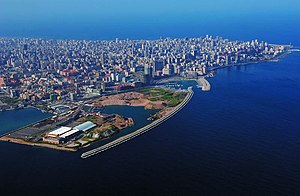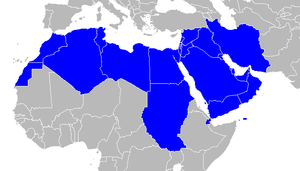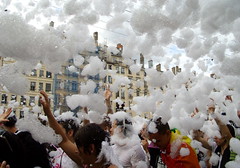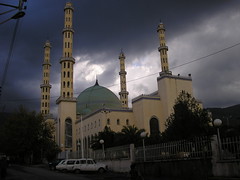Source:
Windy City Times
By Bill Healy
At some point, nearly everyone grapples with their identity—faith, family and sexual orientation.
But, as the following individuals attest, it can be even more difficult for minorities or immigrants struggling to sort through their sexuality.
Phillip Ozaki, 22, Filipino and Japanese-American:
"As if I didn't have enough identity struggle being both Japanese and Filipino, and American, to add the gay identity to it is just a huge struggle."
"The Japanese perspective is one of practicality. It's like, 'Why would you marry a gay person? You can't have kids.' In Japanese culture you're supposed to be very socialized and very like everybody else. It's very taboo and unknown and invalid to be a homosexual.
"But Japanese Americans have this long history of struggle and internment camps and especially civil rights. So I feel like they're more tolerant of other cultures especially the gay community because they understand that American culture can take away the rights of minorities just for being a certain identity.
"The Filipino perspective is very different. Gay means super flamboyant. They're really Catholic. The majority of gay Filipinos I've met are closeted to their parents, and identify as bisexual as a leeway to act like they're straight. In Filipino-American culture I'd say it's the same way: very closeted, very Catholic, very not discussed.
"It's as if no one really gets me, I think. Because I'm ethnic and because I'm a minority it's like this double minority. It's like I'm double silenced. The way I like to say it is: The more of a struggle you have the more you have to fight for."
Ahmad Refky, 30 Egyptian-American:
"If you choose to, you can reconcile your culture, your religion and your sexuality."
"The first time I came to the United States I was 16, a high school exchange student. Then I went back to Egypt for college. That's when I realized more about my sexuality. I came out when I was 18. My natural father beat me and sent me to a therapist. At the same time in Egypt they were starting to arrest gay people and throw them in jail and prosecute them. When I was 21, that's when my host family sent me a plane ticket. It became obvious back then that there was no going back to Egypt. That's when it was suggested to me to apply for political asylum. And I got it. "You have to accept yourself. A lot of gay immigrants still live in their cultures back home. They're afraid to come out. If you live in Chicago but you're afraid to come out because maybe your mother in Morocco will find out, I think that's an irrational fear.
"In Egypt you're growing up in this culture where everything you say is going to reflect on your family. Family is important but when it comes down to choosing between being true to yourself or bending to the breaking point so you can satisfy your family, you need to be true to yourself. You don't have to totally give up your culture to be gay."
Dalila Fridi, 39, Algerian-American:
"It took me a long time to accept myself."
"I came here when I was 19. I came to go to school here but also to live with my uncle and his family. I lived with him while I was taking care of his household and going to school part-time. I was kicked out of my uncle's house when his wife found out I was a lesbian. I was 26. I was raising their kids. The youngest was born the day I arrived to America. So she was like my little girl and all of a sudden I can't be around them because I'm a lesbian.
"I tried to date boys. But it just didn't work out. I was a rebel and in my mind getting married to a man meant I would lose who I am and I would lose my independence.
"When I joined Equality Illinois I met all these other groups—Latino groups, South Asian groups—and I asked myself, 'How about Arabs? How about us Middle Easterners, North Africans?' And I've met these guys before and they always would say they were Latinos. And I would respond, 'No. You don't look Hispanic.' But they would not come out. And then I would say, 'I'm Algerian.' And little by little they would say, 'I'm from here, I'm from there.' They're afraid and still are even after meeting others like us."
Graham Carpio, 55, Filipino and Italian-American:
"Here I am living in Chicago, still culturally backward but totally understanding myself as a gay man."
"I was born in the Philippines where my father worked for the American State Department. My dad is Italian. My mother is Filipino. I went to schools run by the Brits—international schools. Because they catered to the diplomatic corps, the culture there was not American or any particular culture.
"I came to America when I was 16 and realized that I might be gay and that was my first inkling that I might need to have an identity. I came to Chicago. I didn't identify as a Midwesterner because I lived in Manila, Tokyo and Paris and absorbed much of that influence.
"So as I realized I might be gay I latched onto that identity and nurtured that identity because it was the only one that I thought I actually needed.
"The Oscar Wildes, the Stonewall riots, the Harvey Milk types are more a part of my history and cultural identity than George Washington or Abraham Lincoln or Teddy Roosevelt are."
Alicia Vega, 39 Mexican-American:
"There are different layers of identity that exist."
"It's extremely difficult for men to come out in the Latino community because the emphasis is on being masculine and in control. Machismo is extremely emphasized in Latino culture. For women to come out and to say, 'I don't need to have a man in any of my immediate relationships to prosper,' it's almost like being anti-Latino.
"When I went to college and was looking at where I wanted to identify myself, I went first to the Latin American Student Organization. I felt welcome as a Latina but the lesbian piece of me felt left at the door. I looked into the gay student organization but the Latina and the female piece of me was the minority in the group.
"When I became affiliated with Amigas Latinas [ a Chicago-based organization for Latina LBTQQ women ] , I felt like it was the first time that no part of me had to leave.
"In my relationships with women, I tried to fit the traditions of the Mexican culture and Catholic religion into it, for myself and to please my parents. Being lesbian, unfortunately, is counter to many of these traditions, but I still try because it is who I am."
Carlos Mock, 53, Puerto Rican:
"We have three things that make us go crazy—religion, machismo and family."
"In San Juan everybody knows everybody. If you are over 30 and you're single everybody immediately starts talking. I know couples that have been together 35 years and they still have two apartments because they can't live under the same roof.
"I figured I had to get out of that island. I knew I could never pursue my desire to be a doctor there. I never would have been able to have a life. "To my mother the biggest sin that I could make was that I could never give her grandchildren. The Catholic Church is very strong. When I came out she wouldn't talk to me for three months afterwards. The culture is so strong
"I am very out. I don't mind holding hands with my husband. I lost most of my Puerto Rican gay friends because they don't want to be seen with me because I'm loud. It reflects on them. That's how bad it is down there. They don't want people to know that they're gay even though they're more effeminate than someone like Paris Hilton."
Bernard Cherkasov, 33 Azerbaijani-American:
"As immigrants in a new land, my parents stressed that family has to support each other."
"I was born in Azerbaijan, which borders Iran, Turkey and Russia. We fled when I was 13 because Azerbaijan was engaged in a civil conflict, and life for ethnic and religious minorities was increasingly difficult.
"Azerbaijan is trying very hard to engage the western world and as a condition of entering the Council of Europe they had to decriminalize homosexuality in the year 2000. But it's still very taboo.
"By the time I acknowledged to myself I was gay I was nearly 18 years old. I saw positive role models at my university. My parents also saw positive gay role models in their world.
"When I would date somebody the first thing my parents would do was to sit them down and feed them. If you ate all the food, then you were all right with them.
"When they met my now-husband Danny—part of his family comes from Persia and Iraq and India, so the foods he was used to eating is very much like ours—he passed my parents' "food test" from the get-go, and this was comforting to them. He instantly became part of the family."
Cathy Sikora, older than 50, Polish-American:
"It certainly wasn't acceptable when I was young although I know plenty of Polish people who are gay."
"There is still a lot of stigma being a gay person in Polish culture, including being transgender. There are forward-thinking people and people who will accept you. But it's mostly not in their mindset yet. It's not that they're so backward. They're just not there with people being out.
"My sweetheart and I have been together just about 30 years. We are both immigrants. Our daughter is 19. When we were in Poland a few years ago visiting, quite a few people saw us as two women and a teenager. There didn't seem to be an issue, maybe because they saw us as two women visiting.
"While I don't hide who I am these days, I don't advertise either. It was rather confusing when I was young, now I just quietly live my life.
"I knew that it would be a real tough sell to tell anyone I grew up with, Polish people. They're still very traditional. They don't accept things as easily as their American counterparts.
"I think they need to get used to gays and our lifestyles and what we go through."
Imi Rashid, 36, Bangladeshi:
"I definitely face a very real struggle in that I don't think I could ever move back to Bangladesh and live my life the way I do currently. "
"I'm completely out to my mom and my sister. I'm not formally out to my dad. I imagine he suspects it or has gotten hints of some sort from my mom because he no longer asks me when I'm going to get married. "I met a woman in her 50s who came to the States for a conference on gay rights and she has started a small group for lesbians in Bangladesh which was unfathomable to me. I didn't even think that was possible. There's the inkling of a small movement starting. It's nowhere near progressed to the stage where it's a mainstream issue but I think that's part of the reason. There's no visibility.
"In the beginning I didn't think it was important to have a partner who was also Bangladeshi. But at some point down the line it sort of felt like there was this internal yearning for it. Not only to not have to explain myself all the time but all of a sudden it dawned on me that I would really love to be able to speak to my partner in my native tongue. And I'm not sure why that was so important but it just came up as something that I had a longing for. I wrote an essay about it that was published in an anthology and oddly enough my partner was in that anthology and that's how we met. And she's Bengali. And now I can speak to her in my native language and it's the most wonderful thing in the world."
Jason Lee:
"I'm 100% Korean-American. My parents immigrated here. I was born here in America.
"In Chicago there's a really small minority of gay Asian Americans. You hardly see them scattered around in the bars. They're just with a group of people. It's very small and its very close knit and the reason they're close knit is because you don't see them having that family time with their own flesh and blood. With their gay and lesbian friends, they become family because they know that they don't have anyone else to rely on.
"A couple years ago there was a big fad in Korea to be gay. Some celebrities came out. And I got very upset because here in America we fight for our rights.
"Coming from a religious background, it made it difficult for me to come out. I felt very alone. I didn't want to hurt my parents and disappoint them. I really care about them. I know that they still love me because they still do affectionate things but there's a lot of disregard. They didn't kick me out but a part of them is very rock solid, like a wall with me. It makes it difficult but just coming out made me grow up into more of an adult. Because I realized if family can be like that to you, you've just got to stand your own ground. You gotta live."
Liz Thomson, 35, Vietnamese-American:
"From 22 to 30 there was this whole span of reconciling and integrating my multiple identities."
"I'm interim director for University of Illinois' Gender and Sexuality Center and have identified as bisexual since college in the mid-90's. Even before I knew the term, I knew that I didn't only like men.
"My initial awareness of difference definitely came from being adopted by two white parents, which began my racial identity. In college, I explored what it meant to be Asian American in a predominantly white space. Then, about sophomore year, my sexual orientation identity developed. I found myself attracted to a woman even though I'd dated men for high school and college. Being bisexual, means retaining and honoring that feeling of love. After college, it was about putting all my identities together—bisexual, Asian American, adopted, female.
"Our identities develop differently at different times and ways. Right now, I'm bringing all my multiple identities together. I don't think my identities were meant to be cohesive all at once, which is something I wish someone had told me earlier."
Moises Villada, 26, Mexican-American:
"I'm gay, yes, but do I fit the model of mainstream gay America? Physically, it looks very different."
"There's definitely this sense within Mexican culture of the male being uber-masculine and the ideas of machismo being so powerful and even overwhelming to the point where to be a man means to be straight and to be the head of a household.
"My experience was a little different because I never felt that my dad was overtly homophobic or closed-minded. My parents were very open and very receptive to different people so I never got that strong sense of masculinity when I was growing up but it's apparent in soap operas, television and that sort of thing.
"Growing up I had to be in a Latino environment and speak Spanish and then also be in an American environment and speak all English and I was able to see how the two worlds are very different and very contrasted. Being gay in the American identity, it seemed like it was very open, and then in the Latino identity you had to be very quiet. I felt like I was more oppressed in a Latino context than in an American context.
"I didn't realize I had all these identities until I got older and realized that there are pockets of division between all of us in all these ways."
 Image via Wikipedia
Image via Wikipedia















![Reblog this post [with Zemanta]](http://img.zemanta.com/reblog_e.png?x-id=068bba1e-f0ec-4c44-a0fa-6a13cb21693b)

![Reblog this post [with Zemanta]](http://img.zemanta.com/reblog_e.png?x-id=44ad45cf-791e-45e8-ad64-c32ab05e830c)




![Reblog this post [with Zemanta]](http://img.zemanta.com/reblog_e.png?x-id=6b6ca114-38b1-4692-a49b-247dac9f4dd2)





 Join our page
Join our page

